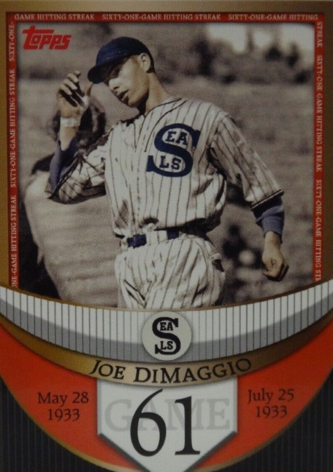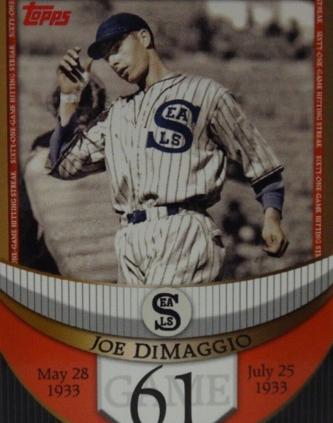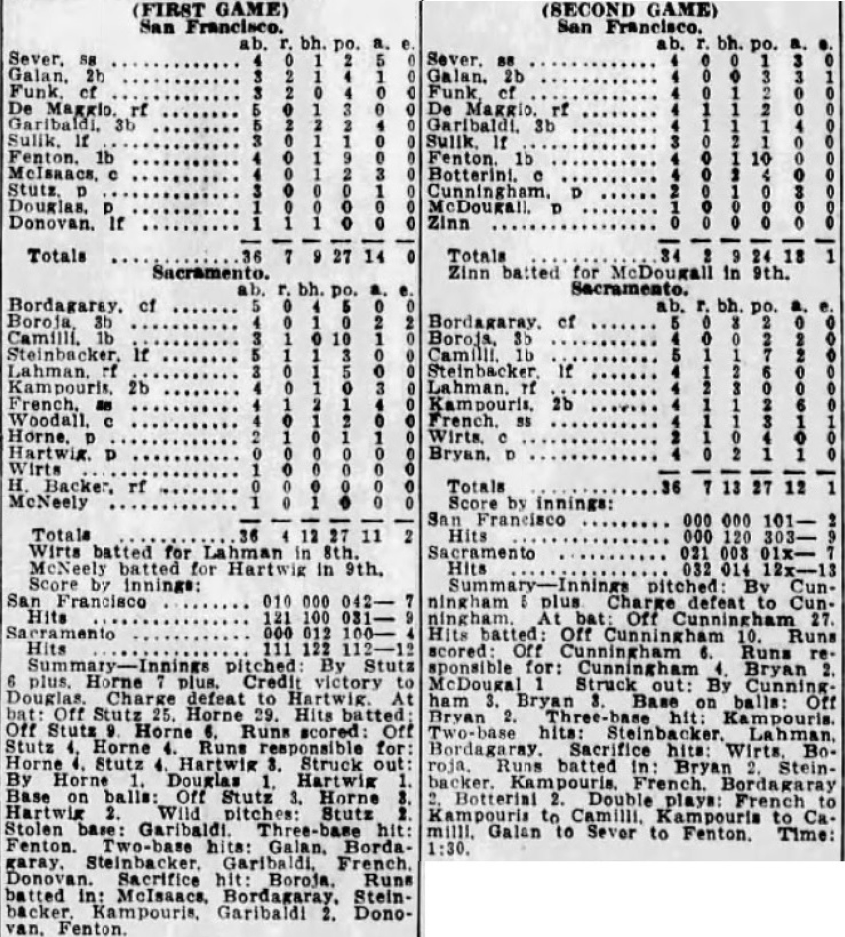July 23, 1933: Seals’ Joe DiMaggio extends hitting streak to 60 games
 When Joe DiMaggio laced a single in the San Francisco Seals’ July 20, 1933, Pacific Coast League game against the Sacramento Senators, it seemed as though the 18-year-old’s hitting streak might go on forever.1 The hit – his seventh in three contests − extended his streak to 56 games and brought him to within 13 games of tying the minor-league record.2
When Joe DiMaggio laced a single in the San Francisco Seals’ July 20, 1933, Pacific Coast League game against the Sacramento Senators, it seemed as though the 18-year-old’s hitting streak might go on forever.1 The hit – his seventh in three contests − extended his streak to 56 games and brought him to within 13 games of tying the minor-league record.2
But DiMaggio began to falter under the mounting pressure. In the next four games, he struggled to hit the ball out of the infield. In each contest, the streak was prolonged by an official scorer’s decision. When it happened for the fourth time, on July 23, Sacramento fans caused a ruckus.3 A mob of fans stormed the press box and a short time later the official scorer left the ballpark under police protection.4
The improbable streak began when DiMaggio, who had started the season at shortstop before his erratic arm forced a move to the outfield, doubled in the second game of a May 28 doubleheader against the Portland Beavers.5 The San Francisco native was in his first full season in the minors, and reporters – even those from his hometown newspapers – had difficulty spelling the newcomer’s Italian surname. For most of the season, he was referred to as “De Maggio.”6
As the streak continued, DiMaggio began to draw big crowds at home and on the road, which was significant for a PCL that was struggling through the depths of the Great Depression.7 San Francisco held a “Joe De Maggio Night” on July 14, and 7,500 fans came out to Seals Stadium hoping to see the youngster break the old PCL record.8 DiMaggio did not disappoint; he singled in his first at-bat against Los Angeles Angels pitcher Bobo Newsom to push his streak to 50 games.9
The controversies began on July 21 in the fourth of a seven-game series between the Seals and Senators. DiMaggio went 1-for-5 to extend the streak to 57 games, with his only hit coming in the fifth inning on a grounder that Sacramento shortstop Ray French had to range to his right to field. His rushed throw was too late to beat the speedy DiMaggio.10
Steve George, sports editor at the Sacramento Union, was the official scorer.11 When George’s scoring decision was announced, there was significant booing from the Sacramento crowd. The Sacramento Bee, citing the swiftness of the runner and the distance French had to move to field the ball, agreed with George’s call.12
DiMaggio went 1-for-4 the next day. His only hit was a “whistling single” through French. “His hit today, off [relief] pitcher [Joe] Noonan, while a legitimate hit, was of the variety which are questionable to the spectators,” observed the Associated Press.13 It was not the last time Sacramento fans second-guessed the official scorer in the series.
Coming into their Sunday, July 23, twin bill with the Senators, the Seals were in last place with a dismal 41-69 mark. Sacramento led the PCL with a 68-43 record, which had them 2½ games ahead of second-place Portland.
As usual, the Senators split the Sunday doubleheader into a morning game in nearby Stockton and an afternoon contest in Sacramento.14 Sportswriter John Peri of the Stockton Record was the official scorer in the morning affair.
Senators righty Trader Horne took to the hill in Stockton in an attempt to stop DiMaggio’s streak at 58 games. Horne kept DiMaggio hitless, helping Sacramento take a 4-1 lead after seven innings. But the Seals staged a four-run rally in the eighth, driving Horne from the game.15 He was replaced by 20-year-old southpaw Bill Hartwig.16
DiMaggio was scheduled to bat fifth in the ninth, so he needed some assistance to get another at-bat. That help came in the form of two walks issued by Hartwig, allowing DiMaggio to bat with two on and two out.17 He tapped a “swinging bunt” to third baseman Tony Boroja, whose rushed throw was late,18 pulling first baseman Dolph Camilli off the bag.19 The crowd impatiently awaited Peri’s decision.
San Francisco scored two runs in the ninth en route to a 7-4 victory. After the game, a group of fans approached the press box at Oak Park Field for the scorer’s decision.20 To the dismay of some, Peri ruled the play a hit, stretching DiMaggio’s streak to 59 games.
Eddie Bryan, a 34-year-old veteran of the minor leagues, got the start for the Senators in the afternoon game in Sacramento. The right-handed hurler limited the Seals to six hits through the first eight innings – none of which were off the bat of DiMaggio. Bryan helped his own cause by knocking in a pair of runs and he took a 7-1 lead into the ninth.21
For the second time that day, the man known as “Deadpan Joe” came to bat in the final inning with his streak hanging in the balance.22 Once again, the 38-year-old French figured in the drama, as DiMaggio slapped a hard grounder to deep short.23 French ranged to his right and after failing to come up with the ball cleanly decided that a throw to first would be pointless.24 DiMaggio was safe at first.
George was the official scorer for the afternoon game. The man who was described by his newspaper colleagues as “graceful” and someone who “never got flustered” had another important decision to make.25 To him, the play was crystal clear: It was a hit.26
The Seals scored a run in the ninth, making the final score 7-2.
A large group of ardent fans, many of whom were already riled up, charged the press box to find out the scorer’s decision.27 It was suggested that some of that anger may have come from fans betting on DiMaggio’s streak ending that afternoon.28 Policemen ushered George into a private office to escape the incensed fans,29 and a short time later they escorted the embattled scorer out of the ballpark.
The Sacramento Bee was far less supportive of the scorer this time, referring to DiMaggio’s grounder in the second game as a “donated ‘hit.’” With perhaps a hint of the discrimination that Italian-Americans and other minorities faced, it noted that fans were “somewhat disgruntled about the boy being allowed further opportunity to break the national record of sixty-nine games with a hit.”30
One report suggested that Sacramento fans considered DiMaggio’s infield hits in the previous three games to be “gifts.”31 The Senators pitchers felt differently. “I’ve seen batters given hits on much easier chances than those of De Maggio’s [sic] last week,” Bryan said a few days later. “If the kid wasn’t going after a record nobody would have said anything about those hits.”32
One of George’s compatriots, Russ Newland, wrote an impassioned article in defense of the scorer. Newland had known George for years and he vouched for his objectivity and fairness. He also pointed out an uncomfortable truth about the mob scene. It “merely proved conclusively [the angry fans] should read the rules of the national pastime more carefully.”33
The Seals returned home to begin a series against the Oakland Oaks a couple of days later. In the series opener, DiMaggio flied out in the seventh inning to fall to 0-for-4 in the game. When the Seals took a 6-5 lead into the bottom of the eighth, his streak appeared to be over – until his teammates rallied for an eventual eight-run inning, giving him another at-bat. DiMaggio seized the opportunity, singling off reliever Lou McEvoy to extend the streak to 61 games.34
It ended the next afternoon when Ed Walsh, son of future Hall of Famer Big Ed Walsh, hung a 0-for-5 collar on the San Francisco slugger.35 “I’m glad it’s over,” said a relieved DiMaggio. “The strain was getting a bit tough.”36 As of the start of the 2023 season, it remained the longest hitting streak in PCL history.
DiMaggio was far from unknown when the streak ended. The national coverage of his exploits in publications like The Sporting News transformed him into a top prospect and all 16 American and National League teams had assigned scouts to follow him.37
DiMaggio ended the season with a .340 batting average and a league-leading 169 RBIs. It wasn’t enough to prevent the Seals from finishing 33 games behind the pennant-winning Angels,38 although his performance helped San Francisco attract over 112,000 fans, which was fourth best in the circuit.39
A knee injury suffered getting into his car in downtown San Francisco in May 1934 delayed the beginning of DiMaggio’s big-league career until the start of the 1936 season.40 Five years after his debut with the New York Yankees, DiMaggio embarked on a remarkable 56-game hitting streak that captured the imagination of baseball fans everywhere. But without the pressure-packed experience of his 61-game hitting streak in 1933, one of the most memorable events in baseball history might not have occurred.
Acknowledgments
Thanks to Dave Munger at the Sacramento Public Library for his research assistance. This article was fact-checked by Kurt Blumenau and copy-edited by Len Levin.
Sources and photo credit
In addition to the sources cited in the Notes, the author consulted Baseball-Reference.com, Retrosheet.org, The Encyclopedia of Minor League Baseball, and Lawrence Baldassaro’s SABR biography of Joe DiMaggio. PCL standings were taken from the Oakland Tribune and Los Angeles Times.
Image of DiMaggio (2007 Topps card #JDSF61) courtesy the Trading Card Database.
Notes
1 Associated Press, “Joe Connects in Fifth to Raise Total,” San Francisco Examiner, July 21, 1933: 17.
2 As of the start of the 2023 season, the minor-league record for the longest hitting streak was still 69 games, set in 1915 by Joe Wilhoit of the Wichita Jobbers of the Class A Western League. “DiMaggio’s PCL Streak Standing Test of Time,” Las Vegas Sun, May 28, 2003, https://lasvegassun.com/news/2003/may/28/dimaggios-pcl-streak-standing-test-of-time/, accessed August 9, 2023; Josh Jackson, “DiMaggio’s PCL Stint Was One for the Ages,” MiLB.com, January 30, 2017, https://www.milb.com/news/dimaggio-s-pcl-stint-was-one-for-the-ages-212550244, accessed August 9, 2023.
3 Russ J. Newland, “Scouting Western Sports,” Grass Valley (Nevada) Morning Union, July 30, 1933: 4.
4 Not all of the fans who charged the press box were angry. Some were in support of extending DiMaggio’s streak. Steve George, “Seal Youth Squeezes By in 9th Twice; Sacs Cut 4-7, 7-2,” Sacramento Union, July 24, 1933: 6; David Jones, Joe DiMaggio: A Biography, (Westport, Connecticut: Greenwood Press, 2004), 14.
5 “DiMaggio’s PCL Streak Standing Test of Time.”
6 Based on a review of articles on newspapers.com, the press began to correctly spell his surname in late August of 1933.
7 “DiMaggio’s PCL Streak Standing Test of Time.”
8 The previous PCL record was 49 games, set by Jack Ness of the Oakland Oaks in 1915. “Jack Ness Fails to Get His Usual Hit,” Fresno Morning Republican, July 23, 1915: 12; Associated Press, “DeMaggio Breaks Coast Record,” Oakland Tribune, July 15, 1933: 11.
9 Newsom previously had cups of coffee with the Brooklyn Robins (1929-30) and Chicago Cubs (1932). He won 30 games for the Angels in 1933, and he went on to win 211 big-league games from 1934 to 1953. Associated Press, “DeMaggio Breaks Coast Record.”
10 French had appeared in 82 big-league games with the New York Yankees (1920), Brooklyn Robins (1923), and Chicago White Sox (1924). He had one of the longest minor-league careers on record, playing in over 3,200 games from 1914 until 1941. Rudy Hickey, “De Maggio Gets Infield Hit in 57th Game; Solons Victors,” Sacramento Bee, July 22, 1933: 19.
11 Hickey, “De Maggio Gets Infield Hit in 57th Game; Solons Victors”; Steve Martarano, Sacramento Union, February 4, 1987, http://www.stevemartarano.com/featuring/steve_george.html, accessed August 9, 2023.
12 Hickey, “De Maggio Gets Infield Hit in 57th Game; Solons Victors.”
13 Associated Press, “Single Through Shortstop Gives Joe De Maggio No. 58,” San Francisco Examiner, July 23, 1933: 19.
14 Stockton is approximately 50 miles south of Sacramento. “Senators Meet Seattle Tribe on Local Field,” Stockton Evening and Sunday Record, April 15, 1933: 6; Associated Press, “Scorer Booed for Giving Hit to De Maggio,” Los Angeles Times, July 24, 1933: 9.
15 Associated Press, “Scorer Booed for Giving Hit to De Maggio.”
16 Baseball Reference does not indicate if Hartwig was a righty or a lefty, but an Associated Press article mentions that he was a southpaw. Associated Press, “Joe Connects in Fifth to Raise Total.”
17 George, “Seal Youth Squeezes By in 9th Twice; Sacs Cut 4-7, 7-2.”
18 George, “Seal Youth Squeezes By in 9th Twice; Sacs Cut 4-7, 7-2.”
19 Camilli made his major-league debut with the Cubs about seven weeks after this game. He went on to win the National League’s Most Valuable Player Award with the Brooklyn Dodgers in 1941. “De Maggio Stops at 61, Mob Charges Scorer,” The Sporting News, August 3, 1933: 1.
20 Associated Press, “Scorer Booed for Giving Hit to De Maggio.”
21 Associated Press, “Scorer Booed for Giving Hit to De Maggio.”
22 DiMaggio earned the nickname Deadpan Joe for showing little emotion after his hits. Associated Press, “DeMaggio Breaks Coast Record.”
23 George described the groundball as “fast.” George, “Seal Youth Squeezes By in 9th Twice; Sacs Cut 4-7, 7-2.”
24 “De Maggio Stops at 61, Mob Charges Scorer.”
25 Judy Tachibana, “Steve George, 86, Sports Editor, Radio Man,” Sacramento Bee, July 23, 1988: 22.
26 George, “Seal Youth Squeezes By in 9th Twice; Sacs Cut 4-7, 7-2.”
27 George, “Seal Youth Squeezes By in 9th Twice; Sacs Cut 4-7, 7-2.”
28 Newland, “Scouting Western Sports”; Jones, 14.
29 Associated Press, “Scorer Booed for Giving Hit to De Maggio.”
30 Rudy Hickey, “Solons Win Five Heats Over Seals; De Maggio Donated ‘Hit’ That Runs String to 60 Games,” Sacramento Bee, July 24, 1933: 13.
31 “In the Sport Light.”
32 “No Gift Hits for De Maggio Say Senators,” Los Angeles Times, July 26, 1933: 23.
33 Newland, “Scouting Western Sports.”
34 Associated Press, “Sixty-One Games for De Maggio,” Los Angeles Times, July 26, 1933: 23.
35 The younger Walsh went 11-24 in four big-league seasons with the White Sox between 1928 and 1932. United Press, “San Francisco Boy Fails to Hit in 62nd,” Napa Journal, July 27, 1933: 5.
36 “De Maggio’s Hitting Streak Ended; ‘I Am Glad,’ Says Joe,” Contra Costa Gazette (Martinez, California), July 27, 1933: 2.
37 Jones, 14.
38 San Francisco finished in sixth place with an 81-106 record. Sacramento faded down the stretch, ending the season in in fourth place with a 96-85 mark.
39 The Seals drew only 103,627 fans in 1932 despite having a team that finished with a 96-90 record.
40 DiMaggio injured himself while getting into his automobile at the corner of Fourth and Market Streets. He slipped on the running board. “Joe Di Maggio Injures Knee,” San Francisco Examiner, May 21, 1934: 21.
Additional Stats
San Francisco Seals 7
Sacramento Senators 4
Oak Park Field
Stockton, CA
Sacramento Senators 7
San Francisco Seals 2
Moreing Park
Sacramento, CA
Corrections? Additions?
If you can help us improve this game story, contact us.



